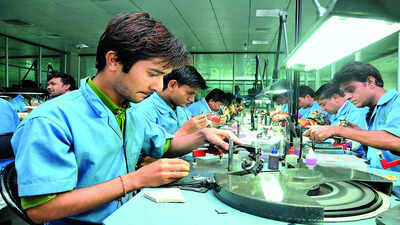- News
- City News
- surat News
- Issue of Russian roughs raised at Kimberley Process annual meet
Issue of Russian roughs raised at Kimberley Process annual meet

Nonetheless, while we are neutral, we are not morally indifferent
SURAT: The issue of broadening the definition of ‘conflict’ diamond in the context of Russia’s war against Ukraine remained at the centre of plenary meeting of Kimberley Process Certification Scheme (KPCS) even as leaders of diamond industry here are confident that it would not impact the current status. The issue was raised by KP Civil Society Coalition (CSC) coordinator Dr Michel Yoboue in his opening address while World Diamond Council (WDC) president Edward Asscher too expressed the need to adopt reforms in KP.
The plenary meeting is taking place in Gaborone, capital of Botswana, from November 1 to 5. Reforms in KP certification were widely discussed as the organisation is all set to complete 20 years next year. The voices are divided over broadening the definition of ‘conflict’ diamond.
Discussion over Russian rough in KP annual meet is a concern for the Indian diamond industry since Russia supplies around 30 per cent of global rough of which 90 per cent come to Surat for polishing. Rough from Russia is an important raw material for the diamond cutting and polishing industry and provides employment to thousands.
“The KP has dragged from one failed reform cycle to another. We fail to discuss the problems that concern us all, or to expose the obstructive forces in this room that hold this entire process in their grip,” said Dr Yoboue. KPCS shared the statement on its website.
“The KP does not allow discussions on how the world’s biggest diamond producing country, Russia, uses diamond revenue to finance a cruel war against Ukraine, a fellow KP member. The long overdue expansion of the KP’s ‘conflict’ diamond definition should include diamonds associated with widespread or systematic violence and serious violations of human rights, regardless of whether they are committed by rebel groups, criminals, terrorists, private or public security forces or any governmental actor,” he further stated. WDC president Asscher said, “If KP does not adopt the reforms necessary to ensure that its rough certification scheme remains relevant in a changed world, natural diamonds could lose relevance with the new generations of socially conscious diamond consumers. The KPCS today offers incomplete solutions, for the current definition of ‘conflict’ diamonds is ineffective in preventing all instances of systemic violence.”
“As I stated publicly, irrespective of what I or my colleagues may feel personally about the dreadful events in Central Europe, a war between two sovereign states clearly falls outside the current mandate of the KP. That is fact, and we would be compounding a tragedy if we allowed the war in Europe to damage what we are able to achieve in Africa.”
“Nonetheless, while we are neutral, we are not morally indifferent. We have clear guidelines. All people should be able to operate safely and securely, without fear of violence or suppression. All law-abiding members of our industry should be granted access to the distribution chain and be allowed to earn fair value for their efforts and ingenuity. Furthermore, the people and communities of all countries fortunate to be blessed with natural diamond resources, and the countries where polished diamonds are processed, should be able to realize the full economic and social benefits that these natural diamonds are able to provide,” Asscher added.
Asscher’s address at the meeting was shared by Gem and Jewellery Export Promotion Council on its website.
The plenary meeting is taking place in Gaborone, capital of Botswana, from November 1 to 5. Reforms in KP certification were widely discussed as the organisation is all set to complete 20 years next year. The voices are divided over broadening the definition of ‘conflict’ diamond.
Discussion over Russian rough in KP annual meet is a concern for the Indian diamond industry since Russia supplies around 30 per cent of global rough of which 90 per cent come to Surat for polishing. Rough from Russia is an important raw material for the diamond cutting and polishing industry and provides employment to thousands.
“The KP has dragged from one failed reform cycle to another. We fail to discuss the problems that concern us all, or to expose the obstructive forces in this room that hold this entire process in their grip,” said Dr Yoboue. KPCS shared the statement on its website.
“The KP does not allow discussions on how the world’s biggest diamond producing country, Russia, uses diamond revenue to finance a cruel war against Ukraine, a fellow KP member. The long overdue expansion of the KP’s ‘conflict’ diamond definition should include diamonds associated with widespread or systematic violence and serious violations of human rights, regardless of whether they are committed by rebel groups, criminals, terrorists, private or public security forces or any governmental actor,” he further stated. WDC president Asscher said, “If KP does not adopt the reforms necessary to ensure that its rough certification scheme remains relevant in a changed world, natural diamonds could lose relevance with the new generations of socially conscious diamond consumers. The KPCS today offers incomplete solutions, for the current definition of ‘conflict’ diamonds is ineffective in preventing all instances of systemic violence.”
“As I stated publicly, irrespective of what I or my colleagues may feel personally about the dreadful events in Central Europe, a war between two sovereign states clearly falls outside the current mandate of the KP. That is fact, and we would be compounding a tragedy if we allowed the war in Europe to damage what we are able to achieve in Africa.”
“Nonetheless, while we are neutral, we are not morally indifferent. We have clear guidelines. All people should be able to operate safely and securely, without fear of violence or suppression. All law-abiding members of our industry should be granted access to the distribution chain and be allowed to earn fair value for their efforts and ingenuity. Furthermore, the people and communities of all countries fortunate to be blessed with natural diamond resources, and the countries where polished diamonds are processed, should be able to realize the full economic and social benefits that these natural diamonds are able to provide,” Asscher added.
Asscher’s address at the meeting was shared by Gem and Jewellery Export Promotion Council on its website.
FOLLOW US ON SOCIAL MEDIA
FacebookTwitterInstagramKOO APPYOUTUBE
Start a Conversation
end of article









